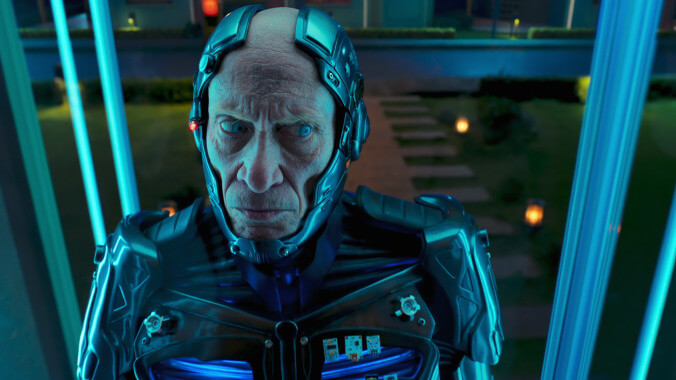Amélie director Jean-Pierre Jeunet goes back to the dystopian future with Bigbug
Malicious AI trap an ensemble of worried humans indoors in this sci-fi satire


Complaints about Jean-Pierre Jeunet’s bizarrely fanciful work may validly abound, but a lack of ingenuity could never be included among them. With Bigbug, the French director of Amélie fame returns to helm his first feature in several years (his last one, The Young And Prodigious T.S. Spivet, was quietly released in 2015), re-teaming with longtime co-writer Guillaume Laurant to take on our digital future. Set in a frightening, novel, not-too-distant 2045, this one-location ensemble piece is populated by sophisticated automatons trying to either emulate or control their human creators.
In this forthcoming day and age, people have completely forgotten how to handwrite. Printed books are now peculiar relics and, because they exalt humanism, considered subversive by the Yonix (François Levantal), artificial intelligence overlords built from parts found scattered along the spectrum between the Terminator and RoboCop franchises. There’s no opening title card serving as a fact sheet on how society operates now in this vibrantly colored dystopia. All necessary context regarding the effects of global warming, animal cloning, and the functionality of gadgets/devices is organically woven into the narrative. Given its acerbic tone and darkly fantastical outlook, Bigbug vibrates closer in tune to the early films Jeunet made with Marc Caro, the dark sci-fi visions of Delicatessen and The City Of Lost Children.
Trapped inside the retro futuristic home of Alice (Elsa Zylberstein), a middle-aged mother with artistic inclinations, a whole ensemble cast scrambles to escape. Painted in saturated hues, the house has become a digitally run prison since the Yonix deemed conditions outside unsafe. At the mercy of these commands, the people inside cope with extreme weather (they can’t regulate the AC) and constant bickering. Sporadically, Jeunet intersperses clips from Homo Ridiculus, a television program where AIs humiliate human contestants for “laughs” (or whatever their emotion-simulating programming understands as appropriate reaction to the morbid humor of this power play).
Not all the wired beings are mankind-hating villains. Domestic android Monique (Claude Perron), reminiscent of Rosey from The Jetsons, is the leader of the household’s gang of talking appliances, made up mostly of outdated models: a toy-like robot that belong to Alice’s daughter, Nina (Marysole Fertard); a cleaning helper (which calls to mind the sidekicks in Mystery Science Theater 3000); and Einstein, the impressive mechanical bust that can engage with its owners in philosophical debates or games of cerebral agility. As the dynamic among the half-dozen inhabitants turns volatile and the Yonix more aggressive, these bots of lesser status vow to help their owners.
Plenty of Bigbug’s visual flourishes—including the giant floating screens that patrol the city, letting each family know what items it must purchase—have been achieved via digital effects. But as is common in Jeunet’s work, the majority of the gadgets are tangible creations. It’s a testament to the whimsical filmmaker’s detail-oriented approach to world-building that so much of the production design becomes a lens through which these people of the future view the past. (See, for example, the Rubik’s Cube that sits behind glass, displayed as an antique.) Far from suffocated by the constraints of a story that takes place almost entirely in one contained space, cinematographer Thomas Hardmeier—clearly guided by Jeunet’s dynamic blocking—frames the action to emphasize claustrophobia while still avoiding visual monotony.
Subtlety has never been one of Jeunet’s tools, and the comedy in Bigbug is enjoyably over-the-top, occasionally a bit too mannered, and often laugh-out-loud funny. The overall heightened atmosphere reaches a peak of exaggerated emotion with Zylberstein’s larger-than-life performance, calibrated to exasperate her sexually frustrated romantic suitor and maybe the audiences as well. The rest of the cast (among them Jeunet regulars Isabelle Nanty as a neighbor and Dominique Pinon as a man literally blinded by transhuman capitalism) take it down a notch on the eccentricity scale, while still playing within the bubble of sci-fi farce.
As is often the case in tales of droids or humanoid entities, the ones here dream of possessing human emotions. Bigbug arrives on the heels of future-paranoid films like The Mitchells Vs. The Machines and Swan Song (and anticipates upcoming movies like After Yang and Dual) that ask whether replications of human life are human in the same way as the genuine article. For Jeunet, a person’s sense of humor is the bastion of our superiority over the machines. But that’s only part of it. Time and again, his flesh-and-blood characters demonstrate their survival instinct, collaborating towards the collective goal of freedom and a need for person-to-person companionship even in this automated era. What it comes down to in the end is that these man-made humanoids also inherited our propensity to err, without the fun parts encompassed in our silly flaws.
Bigbug raises big questions but explores them mostly on the surface, with Jeunet perhaps aiming to set the table for discussions without making any broad statements about where we’re headed. His mad-scientist concoctions, this one included, ambitiously swing for the fences, with no half measures in their aesthetic choices or romanticized interactions. Sometimes they miss the target, but they never fail to spark curiosity. There’s no duplicating Jeunet. He’s an imperfect original.